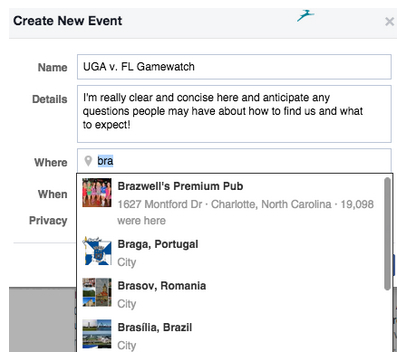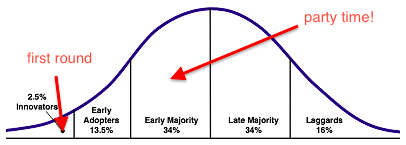As we move right into holiday event season, you’re likely already being inundated with invites, many in the form of Facebook event invitations. As we prepare to end the year with a bang, we want to talk about how to use Facebook to convert early invitees and give your event the momentum it needs to succeed.
Why is it important to have a strategy in place when using social to promote your event? I don't know about you, but if an event invite doesn't have many RSVPs, or if the benefit of attending isn't clear and simple, I'm probably going to skip the party for my latest Netflix binge.
To help improve your turnout, we've put together six high-level tips for promoting your next event on Facebook.
1) Develop a Quality Product
As Guy Kawasaki once told me — really, it was part of a business school project — the most important rule of sales is to have a quality product. When it comes to events, people aren’t just voting with their dollars, they’re voting with their time, sometimes an even harder sell. So really think through the details of what you’re pitching, what you want to accomplish, and why folks should care. People know half-baked ideas from a mile away, and you don’t get a 2nd chance to make a first impression.
Though it’s far better to under-promise and over-deliver vs. the other way around, it’s critical that you articulate what your event will offer that makes it clear to potential guests that it is something they won’t want to miss.
2) Choose an Approach that Makes Sense for Your Goals
It might be useful to take one of two tactics: broad or niche. A broad event is characteristically wide in scope and designed to appeal to all sorts of people in your community. A broad event might be a casual get together with live music to raise money for a local charity. With this kind of affair, you may get higher turnout but lower intensity in terms of desired outcome.
Alternatively, you could decide to go with a niche approach, such as an exhibition to support a proposed local planning commision ordinance favoring street art. Your invite list may be shorter and more selective, and the event may only bring out a dozen people, but those attendees are also likely more inclined to get involved and take further action.
Whether to go broad or niche depends on what you’re trying to achieve.
3) Clearly Communicate Information
I wish this tip went without saying, but all too often key information is missing from Facebook event pages.
For starters, get all the event information (including the event name!) clear and correct before a single FB invitation goes out. Changes after invites are sent out create annoying notifications to your invitees, cause confusion, and come across as unprofessional. The last thing you want is for people to start clicking the dreaded “Turn Off” notifications button on your event. You’ll want the ability to follow up closer to the event with reminders and/or special announcements.
You also want to make sure to fill out all the applicable event fields and include relevant links. When available, let Facebook populate the location of your event with the venue/business entity vs. just typing in the address. That provides richer information and more context. At the end of your description, you might even suggest that RSVPs are appreciated, so that you’re able to better plan the event. Commitments, early and often, are just what you’re after.

The event description is often a big missed opportunity to sell the event. This is your moment to make your pitch, and clearly and concisely articulate why people should show up. It’s also an opportunity to address any implicit questions people may have.
Who are you? Is this legitimate? What are you trying to accomplish? Why should I care? What can I expect to find? What should I do when I get there? Where should I park? How long is the event?
Get a friend to review your short draft and try to poke holes in it. People shouldn’t have to go to another website or Google Maps to find answers to basic questions. That said, including a referral link to a website with event information adds further credibility to your Facebook event and creates opportunities for referral traffic.
4) Stagger Invitations into Rounds
One of the first things you probably do when checking out an event is seeing how many people have RSVP’d, right? Success sells. Consider a first round of invites to people you know will show up either because they’re involved, you’re already friends, you know they’ll be interested, or they are key players you have personally invited by phone, email, chat, or even in real life.
Invite this initial round first, and after 70-80% are committed, invite the next round. These newcomers will immediately see positive momentum: a high number of RSVPs, particularly in proportion to the number invited. These are signs of a successful event-to be. After a couple rounds, open up the invites to the broader community.
It’s actually a lot like the product lifecycle curve: more people are inclined to jump on the bandwagon than be an innovator or early adopter of an unproven event, so show them that you’re way past that stage and they’ll be left out if they stay home.

5) Appoint a Hosting Committee
Nothing formal necessary here, but putting together a host committee is a great way to expand the reach of your event into other people’s networks (OPNs). These are people who are helping you put on or are benefiting from your event, so would be willing to invite their own Facebook friends to it.
The director of the charity you’re promoting, the marketer of the venue you’re partnering with, and leaders and influencers in the community are all great choices. They also just might be friends who want to help you succeed. Fantastic.
Everyone should be personally invited to join your committee. Take the time to do it by phone or ideally in person over coffee or lunch, your treat. That’s your opportunity to explain what you’re trying to accomplish and why, share why you think they’d be a great fit, and ask them to do you the honor of being on your committee. All they have to do is invite their local Facebook friends. As a courtesy, you can and should publicly thank them for their support, with a nod to their business if they’re inclined to that sort of promotion.
Committees of 5-7 are usually sufficient. Any less and your reach might not go far enough, but too many and you risk diluting the board’s importance.
6) Personal Invites
Can’t overstate this one. Much of the success of our agency’s events is from our willingness to take the time to personally invite people to attend. Some by phone, others by instant message, but many invitations are actually extended face-to-face.
Inviting people to an event in person lets them know that you genuinely want them to attend and they’ll be missed if they’re a no-show. It’s also a great opportunity to ask about their family, business, sports, hobbies, or anything else you guys care to catch up about. This sort of bridging of the online-offline divide can play a crucial role in an event’s success.
The heart of social networking should live offline. Social media is just a tool to help you maintain and build those important relationships.
Spread the Word!
Hosting an event takes a lot of work, but the benefits are myriad. If you put your mind to your event promotion and follow these general guidelines, you’ll be well on your way. And don’t be afraid to fail. No event is ever perfect. You are doing great if you’re learning from mistakes and coming back stronger the next time around.
If you’re thinking about organizing an event this year — bravo! It’s hard work but well worth it, and can be a lot of fun! Of course, if your business would like some professional help with your event planning and sponsorship strategies, we can help!
Related reading: Events: The Local SEO Secret that Never Fails to Deliver

